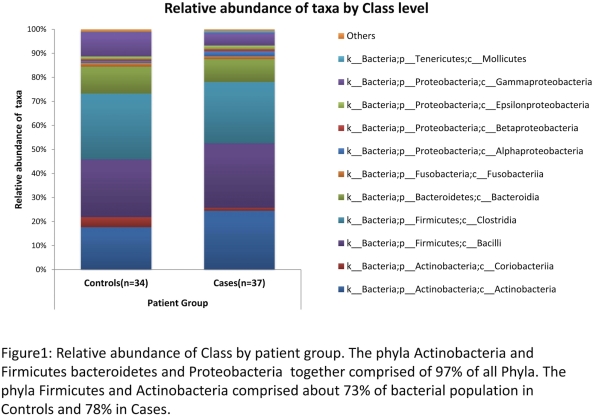Urinary Microbiome Associated with Chronic Allograft Dysfunction in Kidney Transplants
1Medicine, Hennepin County Medical Center, University of Minnesota (UMN), Minneapolis
2Minneapolis Medical Research Foundation, Mpls
3Biostatistics, UMN, Mpls
4Computer Science, UMN, Mpls
5College of Pharmacy, UMN, Mpls.
Meeting: 2018 American Transplant Congress
Abstract number: D82
Keywords: Graft function, Infection, Kidney transplantation, Urinalysis
Session Information
Session Name: Poster Session D: Kidney Complications: Late Graft Failure
Session Type: Poster Session
Date: Tuesday, June 5, 2018
Session Time: 6:00pm-7:00pm
 Presentation Time: 6:00pm-7:00pm
Presentation Time: 6:00pm-7:00pm
Location: Hall 4EF
Background: Microbiome dysbiosis can lead to poor outcomes after kidney transplant (tx) presumably due to immune dysregulation elicited by the microbiome. We hypothesize that chronic allograft dysfunction (CAD) is associated with altered urinary tract microbiome in tx recipients.
Methods: We assessed 16S rRNA, ITS1 and ITS2 microbial gene sequences in urine of 37 patients with CAD (cases) versus urine of 34 patients with stable creatinine (Cr) (controls) compared to a baseline Cr at 3 months post-Tx. CAD was defined as Cr persistently elevatedby 25% or more over the 3 month baseline Cr. All subjects were from the DeKAF Genomics prospective studies and none had clinical infections at time of urine sample collection. Bacterial and fungal sequences were processed using the NINJA-OPS pipeline to pick closed-reference OTUs against the Greengenes (bacterial) and Unite (fungal) databases. Comparisons of the microbiome between cases and controls were done using QIIME and R.
Results: Cases with CAD had significantly different bacterial microbiomes in the urine than controls (p=0.016) Controlling the FDR at 0.05 level, we identified one significant genus, Corynebacterium, that was associated with CAD (P=0.0005). The relative abundance of microbes by phyla are shown.  In contrast to the 5,133 bacterial taxons, only 50-70 fungal taxons were detected in the urine samples.
In contrast to the 5,133 bacterial taxons, only 50-70 fungal taxons were detected in the urine samples.
Conclusion: Urinary microbes were associated with CAD. A larger trial should be conducted to replicate these findings. In the future, the urinary microbiome may be an early predictor for CAD and graft loss.
CITATION INFORMATION: Israni A., Muthusamy A., Wu B., Guo B., Knights D., Al-Ghalith G., Wu J., Oetting W., Schladt D., Remmel R., Jacobson P., For DeKAF Genomics & GEN03 Investigators Urinary Microbiome Associated with Chronic Allograft Dysfunction in Kidney Transplants Am J Transplant. 2017;17 (suppl 3).
To cite this abstract in AMA style:
Israni A, Muthusamy A, Wu B, Guo B, Knights D, Al-Ghalith G, Wu J, Oetting W, Schladt D, Remmel R, Jacobson P. Urinary Microbiome Associated with Chronic Allograft Dysfunction in Kidney Transplants [abstract]. https://atcmeetingabstracts.com/abstract/urinary-microbiome-associated-with-chronic-allograft-dysfunction-in-kidney-transplants/. Accessed February 16, 2026.« Back to 2018 American Transplant Congress
